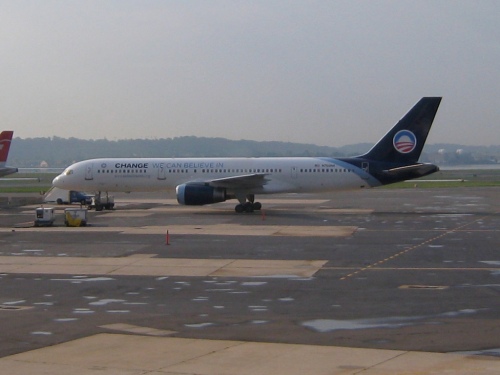Posted in Evan's Commentary, tagged air traffic control, airports, Aviation08, congress, delays, dot, faa, labor, politics, safety, security, small communities, tsa on September 8, 2008|
6 Comments »
Welcome, new readers! For more blogging on aviation politics, click here.

First of all, big props to Obama and his campaign team for actually having a transportation agenda [PDF]. The McCain campaign devotes a whole section to manned space exploration but can’t spare a word for aviation. So, to Obama, an A for effort.
Now let’s dig into the plan:
As our society becomes more mobile and interconnected, the need for 21st-century transportation networks has never been greater. However, too many of our nation’s railways, highways, bridges, airports, and neighborhood streets are slowly decaying due to lack of investment and strategic long-term planning. Barack Obama believes that America’s long-term competitiveness depends on the stability of our critical infrastructure. As president, Obama will make strengthening our transportation systems, including our roads and bridges, a top priority.
Barack Obama believes that it is critically important for the United States to rebuild its national transportation infrastructure — its highways, bridges, roads, ports, air, and train systems — to strengthen user safety, bolster our long-term competitiveness and ensure our economy continues to grow. Investing in national infrastructure is especially important in our efforts to bolster our homeland security to meet international terrorism and natural disaster threats. . . . Barack Obama will address the infrastructure challenge by creating a National Infrastructure Reinvestment Bank to expand and enhance, not supplant, existing federal transportation investments. This independent entity will be directed to invest in our nation’s most challenging transportation infrastructure needs. The Bank will receive an infusion of federal money, $60 billion over 10 years, to provide financing to transportation infrastructure projects across the nation.
Worthy goals. One of the core functions of government is to provide for infrastructure development and maintenance. How will this money be allocated? By DOT, or by Congress? Political realities mandate, for example, that Airport Improvement Fund monies go disproportionately to airports that do not need them as much as the highly trafficked and congested commercial hubs. How it gets allocated is key. (more…)
Read Full Post »

Aviation08: The Obama aviation plan
Posted in Evan's Commentary, tagged air traffic control, airports, Aviation08, congress, delays, dot, faa, labor, politics, safety, security, small communities, tsa on September 8, 2008| 6 Comments »
Welcome, new readers! For more blogging on aviation politics, click here.
First of all, big props to Obama and his campaign team for actually having a transportation agenda [PDF]. The McCain campaign devotes a whole section to manned space exploration but can’t spare a word for aviation. So, to Obama, an A for effort.
Now let’s dig into the plan:
Worthy goals. One of the core functions of government is to provide for infrastructure development and maintenance. How will this money be allocated? By DOT, or by Congress? Political realities mandate, for example, that Airport Improvement Fund monies go disproportionately to airports that do not need them as much as the highly trafficked and congested commercial hubs. How it gets allocated is key. (more…)
Read Full Post »